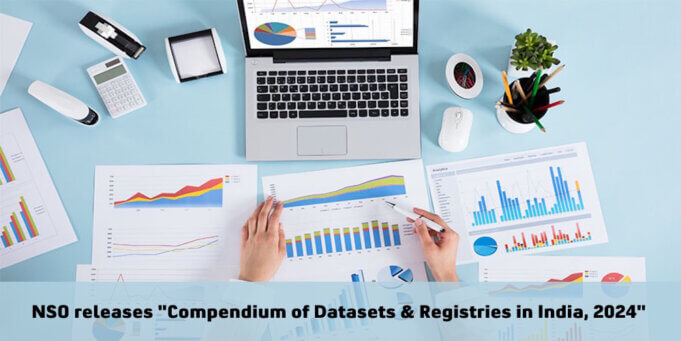The Ministry of Statistics and Programme Implementation (MoSPI) has recently issued the 2024 edition of the Compendium of Datasets and Registries in India. This publication represents a structured effort to enhance data accessibility and facilitate informed decision-making. It forms an integral part of the modernisation of the National Statistical System, ensuring that an extensive array of government-generated data is readily available to a wide range of users. These users include policymakers, researchers, academicians, students, analysts, businesses, and the general public.
At the heart of this initiative is a comprehensive resource that consolidates metadata for approximately 270 datasets and registries. The data compiled in this compendium is sourced from around 40 ministries and departments within the Government of India. The compendium covers diverse sectors, including agriculture, health, education, labour, rural development, tourism, social justice, and banking. By aggregating this information in one document, the compendium functions as a centralized reference tool.
A key feature of the compendium is its focus on standardising metadata across multiple sources. Each dataset entry includes detailed information regarding the methodologies employed in data collection, the periodicity with which updates are issued, and the policies that govern data sharing among various ministries. This standardisation not only ensures uniformity across the datasets but also provides users with clear insights into how data is gathered and maintained. Moreover, the document delineates the legal and regulatory frameworks that apply to the collection and dissemination of each dataset. Such detailed annotations are designed to support a more nuanced understanding of the data and to bolster evidence-based policy formulation.
Another significant aspect of the compendium is the facilitation of direct access to the original data sources. For each dataset or registry included, the compendium offers hyperlinks that lead directly to the respective Ministry or Department portals. This approach eliminates potential barriers to accessing raw data, thereby enhancing the user experience. By offering these direct links, the compendium ensures that all interested parties—from academic researchers to business analysts—can seamlessly navigate to the primary sources of information, thus promoting transparency and efficiency in the use of government data.
The publication of the 2024 compendium aims to foster an environment where data-driven governance is the norm. By consolidating crucial datasets and ensuring that they are regularly updated, the initiative plays a pivotal role in supporting research and promoting evidence-based policymaking. This structured approach is expected to not only enhance administrative efficiency but also to contribute significantly to national development efforts.
Recognizing that the landscape of government data is continuously evolving, the compendium has been designed as a dynamic document. It is subject to periodic updates that reflect the inclusion of new datasets, advancements in data collection methodologies, and revisions in data-sharing policies. This iterative process ensures that the resource remains current and relevant, thereby serving the evolving needs of its varied stakeholders. The commitment to regular updates is indicative of a sustained effort to maintain the integrity and usefulness of the compendium as a tool for both current and future data analysis.
The compendium is intended to serve as a one-stop reference for an array of stakeholders. For policymakers, the standardised and detailed metadata facilitates the formulation of data-backed policies and decisions. Researchers and academicians can leverage the information to support empirical studies, comparative analyses, and academic inquiries. Additionally, students and analysts are provided with a robust framework that can aid in understanding complex data structures and trends. For businesses and civil society organizations, the compendium represents a valuable resource for market research and strategic planning, further emphasizing its role in advancing data-driven governance across various sectors.
An important component of the compendium is its focus on data granularity. By offering insights into the level of disaggregation, the document aids users in performing deeper and more detailed analyses. Such granularity is essential for ensuring that data is not only accessible but also practically useful for drawing informed conclusions. Furthermore, the explicit detailing of legal and regulatory aspects associated with each dataset ensures that users are aware of the boundaries and guidelines that govern the data. This dual emphasis on both analytical depth and regulatory compliance is instrumental in fostering a responsible and informed use of government data.
The initiative undertaken by MoSPI carries significant implications for the evolution of data-driven governance in India. By consolidating critical information into a single, accessible document, the compendium aids in reducing information asymmetry and enhances the overall transparency of government data. This, in turn, supports a governance framework where decisions are informed by empirical evidence and rigorous data analysis.
The 2024 edition of the Compendium of Datasets and Registries in India is available for access through the official website of the Ministry of Statistics and Programme Implementation at www.mospi.gov.in. Stakeholders are encouraged to utilise this resource not only as a repository of current data but also as a reference point that will continue to evolve in line with advancements in data collection and dissemination practices. The ongoing updates and revisions signify a commitment to maintaining a robust and user-friendly interface that meets the diverse needs of its audience.
Cover photo: www.pexels.com











